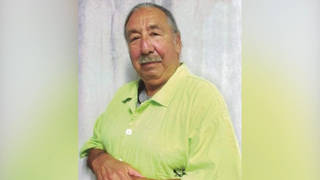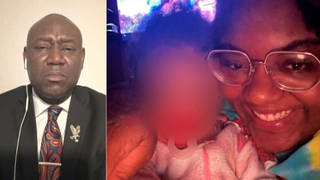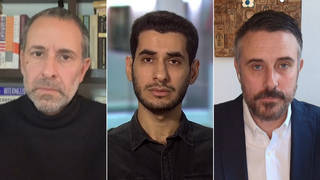
Related
Guests
- Dawud Walidexecutive director of the Michigan chapter of the Council on American-Islamic Relations.
- dream hamptonwriter, activist and filmmaker from Detroit. She’s currently directing a documentary about the brutal murder of 19-year-old trans woman Shelley Hilliard. She’s also a campaign consultant with MomsRising, a million-member-plus national organization that advocates for family economic security.
Anger is growing in the Detroit area over the killing of Renisha McBride, a 19-year-old African-American woman who was shot dead by a white homeowner on his front porch. Her family says she died as she was seeking help after a car accident. The homeowner told police he believed McBride was trying to break into his home, but he claimed his gun accidentally fired at her. No charges have been filed. An autopsy revealed McBride was shot in the face by a shotgun, but not at close range. We are joined from Detroit by Dawud Walid, executive director of the Michigan chapter of the Council on American-Islamic Relations; and by dream hampton, a writer, activist and filmmaker.
Transcript
NERMEEN SHAIKH: Outrage is growing in the Detroit area over the killing of Renisha McBride, a 19-year-old African-American woman. In the early hours of November 2nd, McBride was shot dead on the front porch of a man’s home, where she had reportedly gone to seek help after a car crash. On Tuesday, local media aired audio of a Dearborn Heights police dispatcher who sent police to investigate the shooting after the homeowner called 911 to say he had shot an African-American woman he did not know on his porch.
911 DISPATCHER: [Just received a 911 call] from a male saying he just shot someone on his porch. Then he hung up. We’re trying to call back. [inaudible] Units responding. We have the male on the line, states he doesn’t know this person. Trying to get further.
RESPONDING OFFICER: There’s somebody down on the porch. It appears it’s going to be a black female.
911 DISPATCHER: Copy. Black female.
AMY GOODMAN: The homeowner, whom police have not publicly identified, told police he believed Renisha McBride was trying to break into his home, but he claimed his gun accidentally fired at her. The homeowner, who is white, has not been arrested. An autopsy revealed McBride was shot in the face by a shotgun, but not at close range. McBride’s family says McBride suffered a concussion in the car accident, was seeking help at the time of the shooting. The car accident occurred just before 1:00 a.m. The homeowner reported the shooting at 4:45 a.m. Gerald Thurswell, an attorney for McBride’s family, told the Detroit Free Press he doesn’t believe the homeowner killed McBride by accident.
GERALD THURSWELL: It’s very, very, very hard to believe that it was an accident when the gun is in her face and it goes off accidentally. Somebody had to have their finger on the trigger. He was in a safe place. He was in his house. And he didn’t have to open the door. He could have called 911 to protect himself. And if she was seeking help, he could have called 911 to get her help. So, I don’t think this is justifiable, and I don’t think this is accidental.
NERMEEN SHAIKH: Many observers have compared Renisha McBride’s death to the shooting of Trayvon Martin. On Friday, supporters of McBride rallied in Detroit.
PROTESTERS: Renisha McBride. Renisha McBride. Renisha McBride. Renisha McBride.
PROTESTER 1: It doesn’t make sense why he isn’t here, right now, locked up in a cell on some sort of charge of murder, manslaughter, whatever. It is not just. Why is he still at home?
PROTESTER 2: Renisha could have easily been me. She had a life that was worth us gathering here today.
PROTESTER 3: Every life in our community is valuable, whether you’re in Detroit, whether you’re in Dearborn, whether you’re in Inkster—in particular for us, black life. The fact of the matter is, here’s a person who was in an accident, and she’s trying to seek help, gets a bullet in her head.
PROTESTER 4: I’m sick and tired of seeing black women murdered, raped, beaten, shot, and nobody’s talking about it. I’m sick of the apathy. I’m sick of the apathy in the community. I’m sick of the apathy in the media. And it’s—enough is enough! Where is this man? Who is he connected to? And why don’t we know who he is?
AMY GOODMAN: For more, we go now to Detroit, Michigan, where we’re joined by Dawud Walid, the executive director of the Michigan chapter of CAIR, the Council on American-Islamic Relations.
We’re also joined by dream hampton, a writer and activist, a filmmaker from Detroit, currently directing a documentary about the brutal murder of a 19-year-old trans woman named Shelley Hilliard. She’s also a campaign consultant with MomsRising, a million-member-plus organization that advocates for family economic security.
Democracy Now! reached out to Cheryl Carpenter, the lawyer for the homeowner, and to the Dearborn Heights police, but neither returned our request for an interview.
We want to welcome you both to Democracy Now! dream hampton, what do we understand at this point where the story is?
dream hampton: Well, that’s part of the problem, Amy. The Dearborn Heights Police Department has been the opposite of transparent. We’re calling for transparency on this case. We’ve been calling for transparency on this case. I find it problematic that the media continues to refer to Ted Wafer as a 54-year-old homeowner.
AMY GOODMAN: Well, you’re—you’re naming him now. When you say Ted Wafer, that is the name of the man who shot her?
dream hampton: The Voice of Detroit, a local paper, named him four or five days ago. You’re reporting that the homeowner, the 54-year-old homeowner, shot Renisha McBride. Records show that that homeowner is 54-year-old Ted Wafer. I think that he does not deserve anonymity. He’s neither a minor or a rape victim. This kind of is a collusion, in my mind. And I’m not accusing you of colluding with the Dearborn police, but I’ve not seen media protect a shooter in this way, even if it were an accidental shooting. When accidents are reported, often names are divulged. So I find that incredibly problematic from the outset, and it just indicates the opaque way that the Dearborn Heights Police Department has dealt with the public from the outset of this tragic killing.
AMY GOODMAN: And what is the explanation for this man not being arrested?
dream hampton: His whiteness is the only explanation I can come up with; you know, her black body, justification, de facto. We know that the Dearborn police—Dearborn Heights Police Department is an all-white police force. I have no idea what the conversation was when they arrived at his porch at 4:45 or—it was hours after, it appears to be. And, you know, this is the latest, that we got this call yesterday, the 911 dispatch was released. And we had had earlier reports that—from her autopsy, that she died at 2:45, around 2:45. We have a call coming in from 911 dispatch at 4:45. What happened in those two hours? We have reports initially that her family was told her body was dumped. I mean, this could be a far darker story than any of us could imagine. And I believe that a 19-year-old unarmed teenager being gunned down, being shot in the face in the middle of the night on someone’s porch, seeking help, is tragic enough.
NERMEEN SHAIKH: I’d like to turn to comments made by Cheryl Carpenter, an attorney for the homeowner, who spoke to Michigan Radio.
CHERYL CARPENTER: There was a lot of banging. There was a lot of noise. And it didn’t sound like just knocking. This is a tragedy for everybody involved. And the homeowner is completely torn up. He realizes another person’s life was taken. It was a young woman. And he is devastated by that fact.
NERMEEN SHAIKH: dream hampton, that was Cheryl Carpenter, the attorney for the homeowner. Could you clarify: Has the homeowner even been charged?
dream hampton: No, the homeowner has not been charged. The homeowner wasn’t even inconvenienced with a trip to the precinct to explain what happened the night of Renisha McBride’s killing in the precinct. It’s kind of unfathomable that we have to show up at the Dearborn Police Department ourselves, a hundred of us, and demand transparency, demand an arrest. We’re responsible for the discharge of our weapons, just as we’re responsible for our vehicles. This would be manslaughter, if it truly is an accident. This man should come forward. There is no history of revenge killings when it comes to racial killings in this country. So this—that’s another presumed—like, it’s another presumption of black guilt, that somehow if you release his name and he comes forward and apologizes to the family himself in front of the cameras, that we will hunt him down. I mean, the lack of transparency in this case is deeply, deeply troubling.
AMY GOODMAN: So, there was a toxicology test given to the victim, to Renisha McBride’s body, but Ted Wafer was not tested? Is that the case?
dream hampton: I mean, unless they—unless the Dearborn Heights Police Department produces a toxicology report from that night, which would, to me, seem standard procedure—if someone claims that there was an accidental shooting at their home, then it seems that—it would seem that they would be tested for alcohol or drugs. A toxicology report on Renisha McBride’s body is more criminalization of black corpses. I don’t make the analogy to Trayvon in this case. I think Jonathan Ferrell, killed in North Carolina by the police while he was seeking help after an accident, is a far—
AMY GOODMAN: Now, he was the Florida A&M football player who gets in a car accident, is running toward police, and they shoot him dead.
dream hampton: Yes, he’s a better analogy, if we need make one; I don’t think that we need to. I think that we can deal with Renisha McBride and the life that was lost on its own merit. But this criminalization of black corpses is deeply troubling, as well. We saw this happen with Trayvon. We saw his public record, his school record, his attendance record, whether or not he had ever smoked pot—you know, this teenager, like, kind of criminalized even as he was a corpse. I’m not interested in seeing that happen again with Renisha McBride. Like the family, I’m hopeful that Prosecutor Kym Worthy, who, as you know, Amy, has a very serious reputation, will do the right thing and bring justice for the McBride family.
NERMEEN SHAIKH: Well, Renisha McBride’s aunt, Bernita Spinks, spoke to the local Fox News station about the shooting last week.
BERNITA SPINKS: This man just came to the door, by somebody just knocking. She didn’t break in his house. She didn’t break a window. What, you’re seeing somebody on your porch, and you just start shooting? And then you say it was accidental? That wasn’t accidental. That wasn’t accidental. No. Half of her face is gone. You know, we have to go and bury her, and they’re not even knowing if she’s going to be able to have an open casket. This is a senseless death. My niece is gone. I feel it was not right. Now, the way I’m feeling, I’m feeling it was racist. You’re seeing this black African young lady knocking—not breaking in your house, not breaking a window—knocking for help. He didn’t even try to see what kind of help she needed. He killed her. And he’s out of jail? Wow! Could I possibly do that? Somebody knocked on my door, and I pull my shotgun out, and I shoot them while they’re leaving off my porch, instead of finding out what was the problem—would I be standing here? No, I’d be in jail without a bond.
NERMEEN SHAIKH: That was Renisha McBride’s aunt, Bernita Spinks. Dawud Walid, could you talk a little bit about the significance of the shooting having occurred in Dearborn Heights? Explain what this area is like.
DAWUD WALID: Well, the first thing is that people should understand that Metro Detroit suffers from something which is called hypersegregation, in which there are various communities of people who have little to no interaction. It’s actually been designed that way. The city of Dearborn Heights, which borders Inkster, Inkster is one of the blackest areas in the city, in the state of Michigan. Dearborn Heights is about 80 percent white. There’s really no, like, intersection between these communities. There are basically like invisible fences between communities in southeastern Michigan. And to add onto that, there is a history within Dearborn, as well as Dearborn Heights, of being basically a de facto apartheid or the northern Jim Crow, in the sense there’s a history of racism and racial profiling that has gone on for decades and decades in terms of law enforcement with people of color.
AMY GOODMAN: What about Kym Worthy, Kym Worthy, the Wayne County prosecutor, Dawud?
DAWUD WALID: Well, we’ve had, you know, a history with Kym Worthy, both positive and negative. I will say that in the case of—we had a Michigan imam who was killed about three years ago by the FBI. He was shot 20 times, African American by the name of Imam Luqman Ameen Abdullah. Kym Worthy, she refused to go forward and investigate that case, because the FBI refused to turn over certain information that Prosecutor Worthy wanted, which then it got kicked up—the case got kicked up to the Michigan attorney general at the time, former one, Mike Cox, who’s a Republican, who acquitted and found no wrongdoing by the FBI. And actually, at CAIR Michigan, we have a wrongful death lawsuit relating to the FBI right now.
We’re hopeful that Prosecutor Worthy is going to do the right thing in this case. But it’s also noteworthy that the Dearborn Heights Police Department has also not given Prosecutor Kym Worthy all the information that she needs in order to level the right charges. And this is the important part of civil rights organizations and advocates that we continue to talk about this case and to agitate, that we want Kym Worthy to not kick this case up to Bill Schuette, who is the Michigan attorney general, because we’re afraid that if it gets in the hands of Bill Schuette, who’s also a Republican like Mike Cox, that he might not file charges at all. And at the least, as dream said, if it was—if this was indeed an accident, which I think it was not an accident, at the least, this man, Mr. Wafer, should be charged with involuntary manslaughter, if it’s accidental, as he claims. There has to be some sort of criminal liability regarding this case.
NERMEEN SHAIKH: And, dream hampton, very quickly, before we conclude, Michigan has a law that’s comparable to the “Stand Your Ground” law.
dream hampton: Yes.
NERMEEN SHAIKH: Could you talk about the significance of this potentially in this case?
dream hampton: Well, the Self-Defense Act of 2006—I mean, Michigan is quietly one of the testing grounds where the Koch brothers and other conservative think tanks are backdooring this kind of conservative policy. You know, we saw what happened with Governor Snyder when he basically stripped unions of all rights to negotiate, very quietly, during what was supposed to be almost a holiday season in session. We will—as the Dream Defenders, we are willing to look at—the Dream Defenders, of course, in Tallahassee, agitated and sat in and just organized to have a hearing to repeal Stand Your Ground in Florida. We find ourselves in reactionary positions when it comes to these laws, again, because they are backdoored in into legislative sessions that are often near lame duck. So, if we need to look at the Self-Defense Act of 2006 and consider repealing it, that’s something that we absolutely will do. But first, we want justice for Renisha McBride.
AMY GOODMAN: We want to thank you both for being with us. And the Florida Legislature did just uphold the Stand Your Ground law, though it is certainly a controversy that continues. dream hampton is a writer, activist, filmmaker from Detroit, currently directing a documentary about a brutal murder of a 19-year-old trans woman. She’s also a campaign consultant with MomsRising that advocates for family economic security. And thanks so much to Dawud Walid, executive director of CAIR Michigan, the Council [on American]-Islamic Relations. This is Democracy Now!, democracynow.org, The War and Peace Report. We’ll be back in a minute.












Media Options